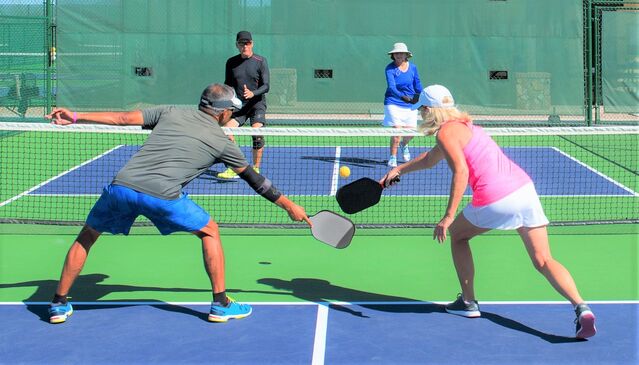Health
Physical and Mental Benefits of Pickleball, With Fun Besides
Playing this trending game is a friendly antidote to pandemic-related boredom.
Posted December 7, 2021 Reviewed by Michelle Quirk
Key points
- Pickleball's popularity is growing across the country, with the number of players increasing 12 percent a year.
- Compared with tennis, a pickle ball moves more slowly, and the court is smaller, so the game is easier on the body.
- Pickleball offers physical exercise, mental exercise, and a likely mental health boost.
The fastest-growing sport in America, with more than 3 million players, is played by hitting a hollow plastic wiffleball punctuated by holes with a hard-surfaced paddle over a short net on a smallish court. It has the odd name of "pickleball," but promises mental and physical exercise as well as fun with friends.
It can be played outdoors or indoors, by all ages. When the weather cooperates, outdoor courts can reduce health concerns during the pandemic. It's a good way to counteract pandemic-related boredom. There is even scientific backing to its benefits.

The U.S.A. Pickleball Association claims the game is growing across the country, with the number of players increasing 12 percent a year. There are tournaments for prize money, professional players and coaches, and courts in California, Florida, Colorado, New Jersey, Virginia, New Jersey, and Illinois, to name a few. You can easily see videos on how to play, view tournament games, and see coaching sessions on YouTube.
The game combines ping-pong, tennis, and badminton and requires players to hit the ball inside a small court. This gives participants the opportunity to move around on their feet and burn calories.
Enthusiasts suggest that the game can offer several potential benefits both physically and mentally. Here are three of them:
1. Physical Exercise
High-intensity interval training (HIIT) has been popularized as an efficient way to get the benefits of aerobic exercise in a short time, and tennis is a good example, with bursts of activity and rest, one after the other. In fact, tennis may be a sport delivering fitness exercise most efficiently, according to an extensive Danish study comparing various forms of exercise, like jogging, biking, and tennis, as they relate to longevity.
But tennis can be limited as players get older and by the availability of courts. Pickleball, played on a shorter and narrower court with more compact movements, can offer some of the benefits of tennis but on a smaller scale.
There is evolutionary evidence for the benefits of physical activity, particularly in middle age and above. This hypothesis argues that humans evolved to be physically active and that moderate physical activity promotes health as it directs energy way away from storing fat into maintaining and repairing muscles, bones, and organs, as explained in an article by evolutionary biologist Daniel Lieberman and others in the current Proceedings of the National Academy of Sciences (December 2021). He observes that hunter-gatherer societies today, like our distant ancestors, typically may get two hours of physical activity daily, often walking five to ten miles daily for food and water. But even more moderate activity can increase blood flow, lower the risk of disease, and maintain better health.
One estimate suggests that 150 minutes per week of moderate activity or 75 minutes per week of vigorous activity could provide such benefits. Pickleball practice and games once or twice a week supplemented by other activities looks like a good start. Some specific benefits are to improve balance, even as people get older, and to become more agile with practice as they use muscles and joints.
Since a pickle ball moves more slowly, and the court is smaller than a tennis court, the game is easier on the body. However, it can lead to strains, such as on the lower back from bending to pick a low ball or hit one near the ground. Like other sports, there are safety precautions to avoid injuries, such as warming up before play, not playing on a wet court, and eye protection. And, though it would be nice to cite a controlled study of the game's effects on health, such connections at present are more a matter of informed speculation.
2. Mental Exercise
The mental game of pickleball is analyzed thoroughly in The Picklewood Bible, which quotes Yogi Berra (Hall of Fame catcher for the NY Yankees) when he said "90 percent of the game is half mental."
Focusing on the ball as it travels across the net in an arc and connects with your paddle is a voluntary type of attention. Visual fixation on the ball for a couple of moments before serving may be a mark of a good player. Movement of your legs and body and a proper swing can be a more automatic, less conscious activity gained after repeated practice. A good swing has been attributed to “muscle memory,” although it's really due to a sequence of neural activity activating muscles in a pattern learned by practice.
Both of these activities require focusing on the ball, moving your feet, and swinging the paddle effectively in a sequence of moves. Without citing any research on how the nervous system works during the game, it is likely that activity in the front of the brain, in the prefrontal cortex, promotes attention focused on the ball. Then activation of nerve cells in the motor cortex provides a sequence of commands to muscles, the parietal cortex participates getting feedback from the body, and the visual system from eye to visual cortex enables visual perception.
3. Mental Health Boost
Pickleball has obvious benefits in meeting people to play in a sociable, cheerful, positive, and low-pressure activity. Playing can enhance self-confidence and self-efficacy—that is, being an active agent by participating in a positive activity.
Evidence is increasing for the beneficial effects of exercise on mental health, possibly by increasing blood circulation to the brain and moderating the physiological reactivity to stress via the hypothalamic--pituitary--adrenal axis and the limbic system. Better sleep, stress relief, and energy can be a result.
Even just watching good doubles players "dinking"—that is, hitting and returning the ball with controlled strokes into the no-volley zone marked off only 7 feet from the net—can be a relaxing antidote to information overload from elsewhere. More important, leisurely practice or playing a game where a team wins at 11 points or a 2-point margin is an efficient use of time.
So, offering physical exercise, mental exercise, and a likely mental health boost, in spite of its funny name, pickleball is a great way to have fun in a friendly setting while gaining health benefits at the same time.
Copyright (c) by Robert A. Lavine, 2021




